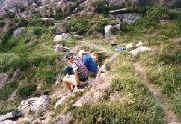AN IRISH PINT
by Patrick Whitehurst, Ireland EditorIt was the tag-end of winter. . .nearing Saint Patrick's Day. It was that time of the year in Ireland when dusk still comes early. The last rays of sunlight peeked through a parting in the drawn drapes and found lazy dust motes to play with. Conor and Angela Quinlan's pub, the Bayview Bar, was quiet and infinitely peaceful at that hour. Their pub is typical of rural pubs throughout Ireland.
Father Crowley and I sat at one of the low tables against the wall enjoying this quiet moment, the peat fire, and our pints of black Guiness.
Only three other men were in the pub at that early hour. They sat at the bar, dressed in worn dark suits, wearing spattered black rubber Wellingtons; the uniform of the West Cork Man. No color for the Corkman, their clothes are as drab and lifeless as their words are wild and bright. 
Author Patrick Whitehurst enjoys a drink in a Kinsale pub.
The men talked to each other in measured bursts, sitting far back on their stools, country caps askew on their heads, pints on the counter, their faces full of weather.
Conor wiped at an imaginary spill before them on the scarred teak counter. Occasionally he drops a dallop of publicans wisdom into the conversation. His offerings always accepted with respect, head-noddings and murmurs of approval. It is an unwritten rule to never dispute the "Landlord". It is a reasonable attitude under the circumstances.
It seems no matter where, no matter what time it is, as long as the door is open, there are people in pubs.
The Irish are a gregarious people. They are drawn to pubs by the presence of other people. Whole families arrive at the pubs in the evening or after Mass on Sunday. The pub is more than tradition. It is a place where weddings, christenings, and funerals eventually end; a place of great happiness, or a place of comfort in times of tragedy and grief. It is a place where proposals of marriage are made and where political aspirations are announced. It is a place to buy a car or sell a horse. It is a place of business as well as a place of pleasure.
"A pub is the poor man's university," proclaims a sign in one of them. And talk is at the heart of it.
"That's why we love our lingering black pints," Father Crowley confided, "there's more time to talk. For us the talk is more therapeutic than the jar."
And talk there is. It is about everything imaginable from farming to international politics. Gossip, learned discussion, and information fly around the room, punctuated by gales of laughter, or the silence of respect as some particularly gifted story teller relates a tale as only an Irishman can.
Someone once figured that there was one pub for every 360 people in the Irish Republic.
There are pubs for fishermen and farmers, pubs for artists and writers, pubs behind blacksmith shops and above beauty parlors. There are expensive pubs in expensive hotels with gleaming wooden bars and stained glass and richly paneled snugs, and there are age-darkened country pubs with tattered dart boards and scarred tables.
Ten thousand nights . . . 100,000 wet-bottomed glasses have etched an overlaying patina on these scarred old tables that become almost works of art. The ring of my own glass makes its mark over others and the pattern subtly evolves. 
Strangers pause to chat along a wind-swept mountain trail on Mt. Gabriel near Schull, County Cork.
PHOTO CREDIT: PATRICK WHITEHURST
But wherever you go, two things will remain constant: the crackling conversation and the robust black Irish stout. It would be irreverent to toss one back. Each rich, full-bodied sip must be savored, the foam licked lovingly from the lip, and the glass replaced reverently on the bar.
If there is art in the drinking there is high art in pulling the perfect pint. I have waited in controlled impatience for more than ten minutes as some conscientious Landlord went through the ritual of drawing that perfect pint and topping off the crown to exactly one-half inch.
I have had a pint or two drawn here in the States. In Ireland I would have returned them immediately. I have tried bottled stout here that no more resembles stout than would lemonade. No, I'm afraid I shall have to wait until I return to have a pint of the "Black Stuff" . . . the real stuff.
There is an old Irish adage: "The first cup for thirst, the second for pleasure, the third for intemperance, and the fourth for madness."
On my last night in Kilcrohane, County Cork, Ireland, I dropped into the Bayview for sad farewells. Conor called, "Last drinks gentlemen. Time gentlemen. Time."
I opted for madness.
